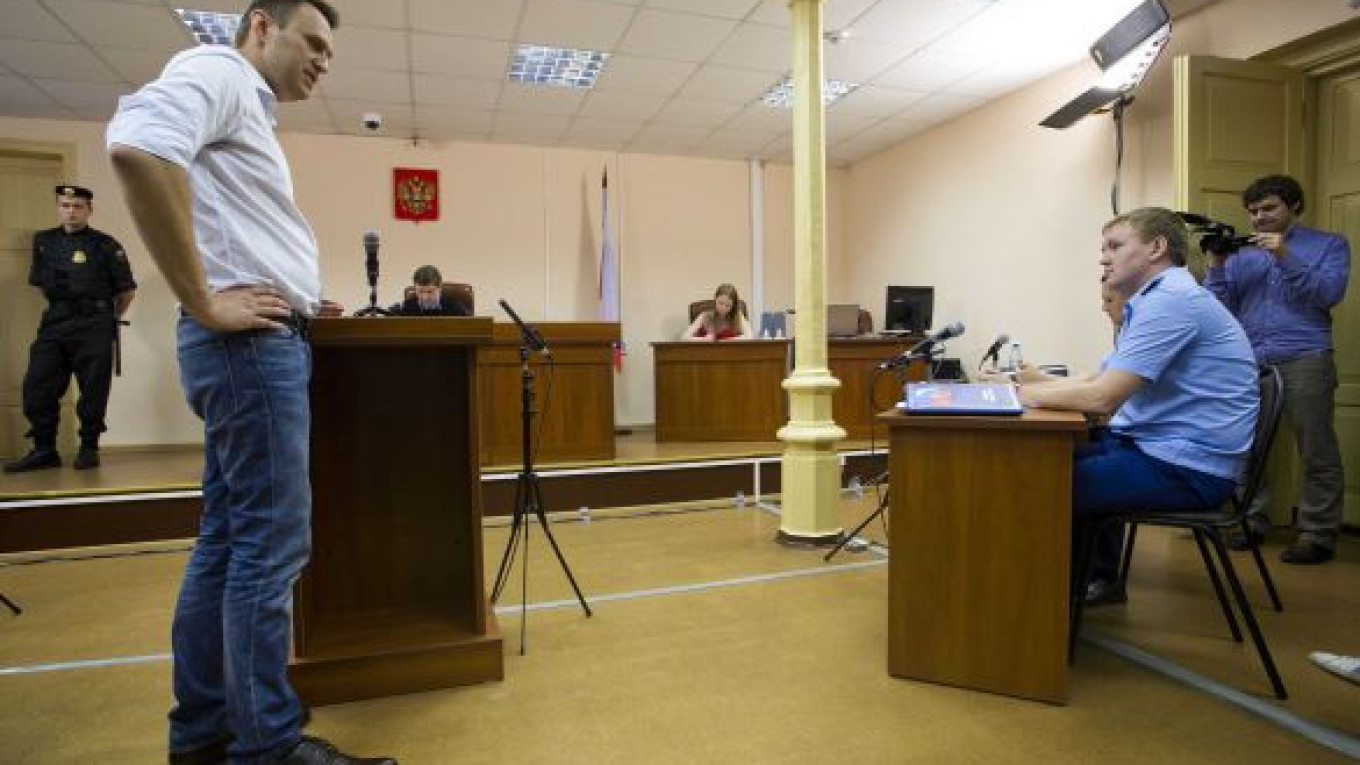Opposition leader Alexei Navalny took the stand in court on Monday, denying charges that he stole 10,000 cubic meters of timber from KirovLes in 2009 and saying he had tried to fight corruption at the state-owned company.
Navalny, who is also a prominent anti-corruption blogger and a lawyer, began testifying Monday at Leninsky District Court in the provincial city of Kirov in the high-profile trial that began in mid-April.
The anti-Kremlin leader says in court that all 35 prosecution witnesses gave evidence contradicting the charges against him.
Prosecutors accuse Navalny, who worked as a volunteer aide to Kirov region governor Nikita Belykh in 2009, and businessman Pyotr Ofitserov of making KirovLes executives sell 16 million rubles ($500,000) worth of timber to Ofitserov's company VLK at below-market prices.
Critics of the case believe that authorities initiated it to achieve a criminal conviction of Navalny, which would make him ineligible to run in elections. Navalny has announced plans to compete for the post of Moscow mayor in the Sept. 8 race and has voiced presidential ambitions. He faces up to 10 years in prison if convicted.
In court Monday, Navalny called the charges "absurd," saying they "contradict the actual circumstances of the case [and] expert findings,"? Interfax reported.
"I never received any money [or] benefits from the interaction of VLK and KirovLes," Navalny said.
Navalny told the court that Ofitserov, his acquaintance, arrived in Kirov because Governor Belykh? promised support to entrepreneurs.
Ofitserov echoed Navalny's testimony, telling the court that he never paid Navalny for anything.
It was also announced in court Monday that the case materials included results of a police probe that concluded that Navalny had received no money from VLK, Navalny tweeted, without elaborating on who revealed the information.
Veteran human rights campaigner Lyudmila Alexeyeva, who heads the Moscow Helsinki Group, said Monday that Navalny was "being tried for crimes he didn't commit," Interfax reported.
According to Navalny, in 2009, Belykh asked him to analyze the work of KirovLes, which was suffering financial losses, and to find a market for its products.
After studying KirovLes documents, Navalny said he discovered that the company's sales procedures were not transparent, since the company had no uniform pricing policy or uniform sales policy and received payment for its timber in cash, contrary to the generally accepted practice of bank transfers.
Both former KirovLes director Vyacheslav Opalev and the heads of the 38 forestry enterprises that made up KirovLes were "keen on selling for cash, and this clearly contradicted the law," Navalny said.
Opalev was handed a four-year suspended sentence in December after pleading guilty to conspiring with Navalny to sell KirovLes timber at below-market prices.
But Ofitserov, speaking in court Monday, said he bought timber from KirovLes at market prices, although Opalev insisted that he in fact paid above-market prices. Navalny also disputed Opalev's version of events, saying that Ofitserov and Opalev became acquainted and communicated without his involvement.
Opalev's conviction and testimony seem to be key to the prosecution's case. Prosecution witness Andrei Votinov, a former aide to Governor Belykh who is serving a three-year prison term on charges of receiving a 3 million ruble bribe from Opalev, told the court in May that Navalny's case was based on the testimony of "one single person" — Opalev.
Navalny alleged on his Livejournal blog Monday that all 35 prosecution witnesses had testified in his favor, saying that video records of their testimony posted on his blog proved it.
Navalny has sought to discredit Opalev, pointing to various accusations of illegal behavior by him. According to Navalny, Opalev created a company, Kirovlesproyekt, where his son started working and that received an allegedly illegal subsidy of 45 million rubles, Itar-Tass reported.
Regional police opened a criminal case against Opalev in January 2011 linked to Kirovlesproyekt on abuse of authority charges but later closed it, The New Times reported in August. During the inquiry, Opalev was suspended from his job but was reinstated after the case against him was closed.
Contact the author at [email protected]
Related articles:
A Message from The Moscow Times:
Dear readers,
We are facing unprecedented challenges. Russia's Prosecutor General's Office has designated The Moscow Times as an "undesirable" organization, criminalizing our work and putting our staff at risk of prosecution. This follows our earlier unjust labeling as a "foreign agent."
These actions are direct attempts to silence independent journalism in Russia. The authorities claim our work "discredits the decisions of the Russian leadership." We see things differently: we strive to provide accurate, unbiased reporting on Russia.
We, the journalists of The Moscow Times, refuse to be silenced. But to continue our work, we need your help.
Your support, no matter how small, makes a world of difference. If you can, please support us monthly starting from just $2. It's quick to set up, and every contribution makes a significant impact.
By supporting The Moscow Times, you're defending open, independent journalism in the face of repression. Thank you for standing with us.
Remind me later.


